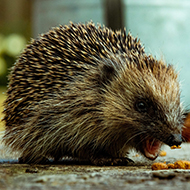
A new study reveals 'hedgehog hotspots' in Greater London.
Conservation scientists at the Zoological Society London (ZSL) have discovered that suburban gardens, parks and allotments are vital for urban hedgehogs' survival.
Using data collected by the public in Greater London, the study 'Using citizen science to understand and map habitat suitability for a synurbic mammal in an urban landscape: the hedgehog Erinaceus europaeus' found that the loss of connected wild spaces replaced with driveways, pavements and roads significantly lessens hedgehogs' chances of survival.
The team created a map of predicted habitat suitability for hedgehogs in Greater London, using the the data of 3012 hedgehog occurrence records collected by citizen scientists in the area.
Co-author of the study, published in Mammal Review, and coordinator of ZSL's London HogWatch programme, Chris Carbone, said: “We know that urban centres can provide important habitats for hedgehogs in the UK, but in London their distributions have declined substantially, and the remaining populations are becoming increasingly isolated.
“Through the London HogWatch project, we aim to identify hedgehog strongholds across the capital and use our surveys to inform hedgehog conservation efforts and ultimately work to increasing connections between populations.
“Hedgehogs need access to green spaces and holes in garden fences allows them the space to feed and thrive in urban neighbourhoods.”
Robin Freeman, co-author of the study, added: “Understanding how we can co-exist with important species like the European Hedgehog is critical.
“As our populations increase and our cities expand, our impact on these species could be severe. It wonderful to see that there are habitats within our capital that allow these species to continue and understanding how to sustain this in the future is an important next step.”
Image (C) Christopher Morgan



 The RCVS has announced a new version of its 1CPD mobile app, with enhanced features for veterinary surgeons and veterinary nurses to record their continuing professional development.
The RCVS has announced a new version of its 1CPD mobile app, with enhanced features for veterinary surgeons and veterinary nurses to record their continuing professional development.